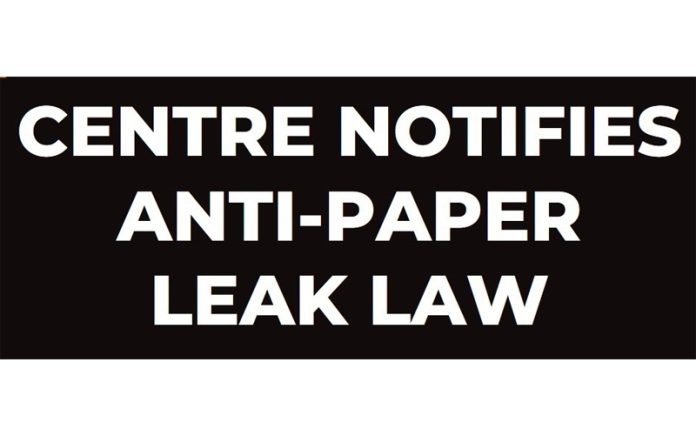The recent notification of the rules under the Anti-Paper Leak Law by the Centre marks a significant stride in ensuring the integrity and fairness of public examinations in India. The Public Examinations (Prevention of Unfair Means) Act, 2024, which has been operationalized, reflects the commitment to safeguarding the sanctity of recruitment processes conducted by various public bodies, including the Union Public Service Commission, the Staff Selection Commission, and others. This law, unprecedented at the national level, aims to eliminate unfair practices that have long plagued these crucial examinations. The Anti-Paper Leak Law is a legislative milestone. The provisions for stringent penalties-ranging from three to five years of imprisonment for cheating and five to ten years for those involved in organised cheating crimes, along with a minimum fine of Rs 1 crore-are designed to serve as a robust deterrent against malpractice.
Central to the implementation of this law is the National Recruitment Agency (NRA), which has been tasked with preparing comprehensive norms, standards, and guidelines for conducting computer-based tests. This includes standard operating procedures for the registration and auditing of examination centres, the layout of seating arrangements, and specifications for computer nodes, servers, and network infrastructure. Such meticulous detailing is crucial in ensuring that examinations are conducted smoothly and securely, minimising the scope for any malpractices. The NRA’s role, as outlined in the newly notified rules, extends to every aspect of the examination process. This includes pre-examination activities like auditing the readiness of examination centres, biometric registration of candidates, and ensuring secure question paper setting and loading procedures. During examinations, the NRA is responsible for overseeing invigilation and ensuring adherence to security protocols. Post-examination activities, such as the management of results and guidelines for providing scribes, also fall within its purview.
In recent times, the cycle of advertising entrance exams, conducting them, and then cancelling the results has become a routine issue. This has led to a decline in the quality of selected candidates and an increase in unfilled vacancies. This vicious circle seems endless and offers no relief. Consequently, departments are operating with reduced staff despite having the financial means to employ additional personnel.
The importance of these measures is immense. Public examinations are gateways to numerous prestigious and influential positions within the Government. Any compromise in their integrity not only undermines the credibility of the selection process but also jeopardises the quality of governance by potentially placing unqualified individuals in critical roles. The approach to preventing unfair means in public examinations is multi-faceted, reflecting a comprehensive understanding of the challenges involved. By allowing public examination authorities to engage the services of other Government agencies, the law provides a framework for a collaborative effort to combat examination fraud. This is particularly relevant in a country as vast and diverse as India, where logistical challenges can vary significantly across different regions. Furthermore, the NRA’s mandate to consult with stakeholders in preparing norms and guidelines ensures that the rules are pragmatic and take into account the ground realities of conducting examinations.
While the Anti-Paper Leak Law and the corresponding rules are commendable steps, their implementation will undoubtedly present challenges. Ensuring that all examination centres comply with the specified norms, maintaining the security of digital platforms, and effectively managing large-scale biometric data are formidable tasks. However, with the right oversight and continuous refinement of processes, these challenges can be addressed. The successful implementation of this law will not only benefit aspirants by providing them with a level playing field but also enhance the overall quality of governance in the country by ensuring that only the most deserving candidates are selected for critical public roles. As this law takes effect, continuous monitoring, stakeholder engagement, and adaptability will be key to its success, resulting in future public examinations being more secure and transparent, paving the way for a more meritocratic system.
Trending Now
E-Paper


